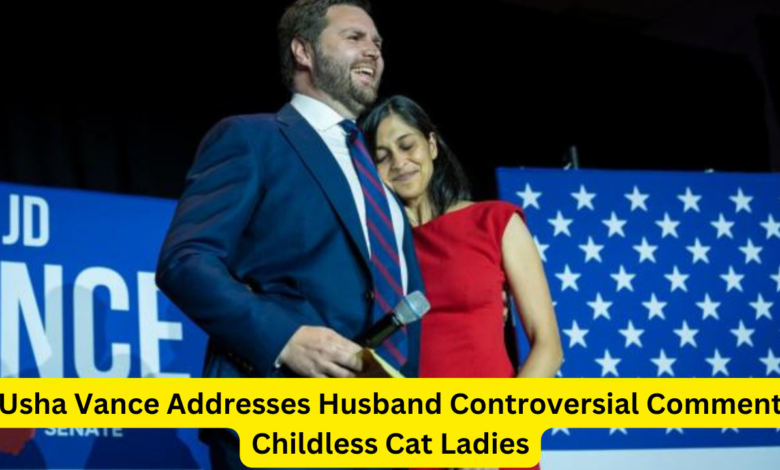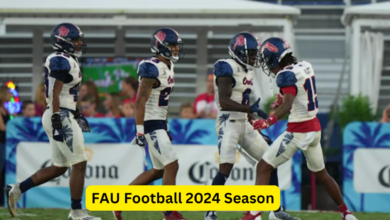Usha Vance Addresses Husband Controversial Comment Childless Cat Ladies

Usha Vance Addresses Husband Controversial Comment Childless Cat Ladies, In a recent and highly anticipated interview with Fox News, Usha Vance, wife of Republican vice-presidential nominee JD Vance, took the spotlight to address her husband’s controversial remarks about “childless cat ladies.” This article delves into the details of the interview, exploring the context of JD Vance’s comments and Usha Vance’s defense of her husband’s statements.
Understanding the Controversy
JD Vance, a prominent Republican figure and vice-presidential nominee on former President Donald Trump’s ticket, has stirred public discourse with his comments targeting childless adults. His use of the term “childless cat ladies” to describe certain Democratic politicians has sparked a mix of outrage and debate. This term, viewed by many as derogatory, was intended by Vance as a critique of individuals he believes are out of touch with the challenges faced by parents.
In her first solo interview, Usha Vance sought to clarify and contextualize her husband’s remarks. According to Usha, JD Vance’s comments were meant as a “quip” rather than a serious attack. She explained that his statements were part of a broader argument about the difficulties of parenthood and the government’s role in supporting families.
The Interview Breakdown
Context of the Comment
In the interview, Usha Vance articulated that her husband’s comment was intended to highlight the differences in perspectives between those who have children and those who do not. JD Vance’s remark was seen as an attempt to underscore his belief that certain policymakers lack empathy for the challenges faced by parents. By framing the debate in this manner, Vance aimed to bring attention to what he perceives as a disconnect between policymakers and everyday families.
Public Reaction and Media Coverage
The term “childless cat ladies” has drawn criticism from various quarters, with many accusing JD Vance of being dismissive and disrespectful. Critics argue that such labels perpetuate stereotypes and fail to engage in constructive dialogue. The media has widely covered the comment, focusing on the potential political fallout and public backlash.
Usha Vance’s defense centers on the idea that the comment was not meant to be taken literally but rather as a rhetorical device to make a point. She emphasized that her husband’s intention was not to belittle individuals without children but to spotlight the broader issue of policy-making from a parental perspective.
The Political Implications
JD Vance’s comments come at a crucial time as he campaigns alongside former President Donald Trump. The backlash against his remarks could have significant implications for his campaign, especially in a politically charged climate where every statement is scrutinized. Usha Vance’s defense aims to mitigate the damage by framing the comment as a minor gaffe rather than a central issue.
Impact on the Campaign
The controversy has the potential to affect voter perceptions of JD Vance. As a vice-presidential nominee, his ability to connect with a broad electorate is essential. While Usha Vance’s explanation may provide some relief, the long-term impact on his campaign will depend on how well the situation is managed moving forward.
Responses from Opponents
Opponents of JD Vance have seized upon the controversy to bolster their own campaigns. By highlighting the derogatory nature of the comments, they aim to draw attention away from their own positions and capitalize on any perceived weaknesses in Vance’s public image.
Broader Implications on Political Discourse
This incident reflects broader trends in political discourse, where statements made in jest or with rhetorical intent can quickly become flashpoints for controversy. The incident raises questions about the nature of political communication and the line between provocative rhetoric and respectful debate.
Navigating Controversies in Modern Politics
Politicians today must navigate a landscape where even offhand remarks can become major issues. The ability to manage and respond to such controversies is crucial for maintaining public support and ensuring that political messages are received as intended.
Public and Media Reactions
The media’s role in amplifying controversial statements can often shape public perception more than the statements themselves. The extensive coverage of JD Vance’s remarks underscores the media’s influence in framing political debates and highlighting issues of public concern.
Conclusion
Usha Vance’s recent interview provided a platform for addressing and contextualizing her husband’s controversial comments. While the term “childless cat ladies” has undeniably stirred debate, Usha’s defense focuses on interpreting the remarks within the broader context of JD Vance’s political arguments. As the controversy unfolds, the impact on JD Vance’s campaign and public perception remains to be seen.




